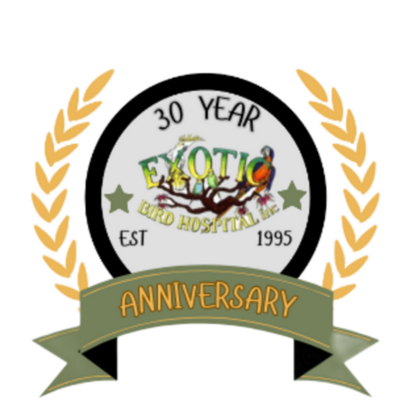
Biological Facts
Lovebirds are intelligent, relatively nondestructive birds that can make entertaining companions for families. They are mischievous birds that like to hide, such as under paper, in shirt pockets or in long hair. They are generally poor talkers, but they can easily learn tricks. Single lovebirds in the home can be relatively quiet and may be affectionate, although some adult birds may be nippy. In a colony situation, however, lovebirds do not live up to their name, as they are territorial and may kill new additions or weak birds that behave erratically (including youngsters).
Diet- Lovebirds are granivores and frugivores.
- Since psittacine birds hull seeds before ingestion, they do not require grit. In fact, some individuals will overeat grit when ill putting the bird at risk for impaction.
- All-seed diets are deficient in protein, vitamins, and minerals including calcium and vitamin A.
- Cage dimension should be at least 18 in (2.5 cm) long and 18 in (2.5 cm) wide.
- Cage bar spacing should be approximately 3/8 to 7/16 in (0.95-1.1 cm).
- At least two perches without sandpaper should be provided with 3/8 inch diameter.
- Perch diameter should be between 3/8 in (0.95 cm). Provide at least two perches. Sand paper perch covers are very abrasive to the feet, and are not recommended.
- Provide frequent water baths or showers to maintain normal skin/feather quality.
- Feather and skin abnormalities
- Circovirus
- Self-mutilation
- Bacterial infections
- Chlamydiosis
- Aggression
- Cannibalism
- Fungal infections
- Obstetrical problems (egg binding)
Lovebirds that are allowed unrestricted freedom in the home can encounter numerous physical dangers or toxins; therefore, wing clipping is recommended. The goal of clipping the wings is not to make the bird incapable of flight, but to prevent it from developing rapid and sustained flight and to prevent escape. Maintenance trimming is required 8-12 weeks after the start of a molt cycle.






